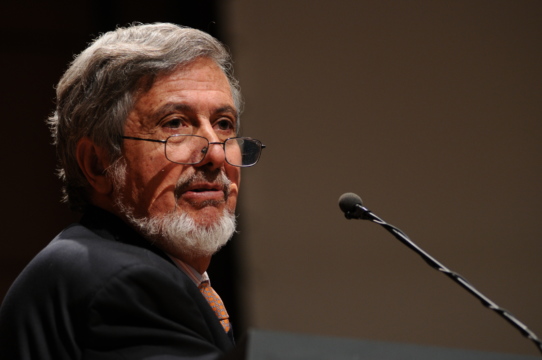
Impact of Lower Commodity Prices on Latin American Growth
With the recent decline in commodity prices, why have some countries have fared better than others?
A Daily Publication of The Dialogue
A congressional committee in Peru last month approved legislation that would replace the country’s private and public pension plans with a government-run system, sending it to the floor of the unicameral Congress. What are the most important elements of the proposed legislation? What are its major benefits and drawbacks? Is Congress likely to speedily approve it ahead of April’s presidential election, and to what extent is the electoral race playing a role in its passage?
Luis Miguel Castilla, former Peruvian finance minister: This ‘reform’ does little to improve the main challenges confronting Peru’s pension system: its low coverage (one in three Peruvians contribute to a pension fund) and insufficient pension payments. This bill creates a new public entity to consolidate both public and private schemes and relegates the private pension system to an asset management role. Moreover, it mandates that an undefined portion of all individual funds be set aside to finance a minimum pension for the poor, invoking the need for more solidarity. These are not sound ideas given the government’s poor track record in managing long-term savings and the lack of a guarantee that fiscal voracity may divert pension receipts to other uses in the future. Furthermore, creating a compulsory contribution will further increase labor informality (the main reason behind the low density of contributions). General taxation revenues should finance minimum pensions. Although the interim head of Congress intends to first submit the proposal to the specialized congressional commissions for further debate (supposedly seeking inputs from all technical bodies), the prevailing populist stance may well prevail. Some parties have threatened a no-confidence vote on congressional leadership to force a particular course of action. Given the recent Constitutional Tribunal’s ruling that renders unconstitutional the law that enabled the devolution of public pension funds to its affiliates, Congress may well decide to show its political strength and proceed with a vote. Upcoming elections are a crucial motivation underlying most congressional decisions, and the government’s weakness is unable to mitigate this situation."
Cristian Rodriguez, chairman and former CEO of AFP Habitat: “Probably the most critical factor that explains levels of pensions in Latin America besides income is the lack of contributions. Informal jobs represent a large section of the labor force. As long as that level of informality persists, it will be very difficult to have a sustainable pension system. The proposed legislation does not deal with this issue, so it is very unlikely to be sustainable in the long run. The big challenge is how to increase the number of contributors and the amounts of contributions that each Peruvian makes, not how to redistribute the payments of the few who contribute to the system. The most important elements are those not being addressed: the universality of the contributions and the retirement age. Benefits include unifying old-age aid programs and setting up a first pillar financed with general taxes. Drawbacks include using labor taxes to finance current pensions, which disincentivizes formal jobs, and concentrating pension savings under a government administration and related activities into a state-owned monopoly is a big step back from consolidating an efficient and transparent system. For a viable pension system, incentives must be created to encourage the informal economy to become formal, but this proposal may do the opposite. Such an important reform for the long run should not be done in a rush and without technical advice. The finance minister and central bank do not favor this proposal. It is not realistic to have a sober dialogue about a long-term reform during the heat of an election campaign.”
Mercedes Aráoz, former second vice president of Peru and professor of economics at Universidad del Pacífico in Lima: “Peru’s entire pension fund system must be reformed as part of a well-thought-out overhaul in which labor market and social security system (both health and pension) reforms are seen as an integral part of the process. Seventy percent of Peru’s labor force is informal and doesn’t have coverage. The public-sector manager (ONP), a solidarity program, is broken and fueled by fiscal resources. Four and a half million people are in the private system, but some of them will not receive a minimum pension because of their intermittent participation in the formal market. The bill proposes a public entity that would collect funds from salaries and the private sector in a two-tiered system, one based on individual accounts and the other on a solidarity system. This becomes a tax on payroll, pushing more people into the informal sector. Nothing is said about how funds will be distributed between these two tiers. The idea of having a solidarity tier is not bad, but it should be funded by the Treasury, not by taxing payrolls and promoting informality. It also seems unconstitutional for people in the private system to be forced to transfer to the new one. Moreover, the public entity will select, without any given rules, who will invest the money. The proposed legislation, without consulting authorities and stakeholders, appeared during a presidential campaign, and from a delegitimize Congress following political turmoil. Some candidates such as César Acuña, leader of APP, the same party of Carmen Omonte, the president of the committee and his vice-presidential candidate, have said that the debate should be postponed to the new Congress. But nobody can predict this Congress’ behavior, given legislators’ populism and low commitment to their own parties."
Pablo Antolin, principal economist and head of the private pensions unit at the Organization for Economic Cooperation and Development: “The main discussion in Latin America is whether to have pay as-you-go (PAYG)-financed public pensions or funded private pensions as current arrangements fail to deliver adequate retirement income. This discussion misses the point. Current pension arrangements fail to deliver adequate retirement income because contributions are low, by international standards, to finance levels of retirement income above 50 percent of final salary. Moreover, the number of periods that people actively save to finance retirement is quite short, by international standards. The OECD recommends combining both PAYG and funded pensions, designing them so that they complement each other. This means that all individuals in active life contribute to both and, when in retirement, their overall retirement income comprises income from both. The OECD also argues that it is essential, for any pension system to work and have public trust, to have a strong old-age safety so that all retirees enjoy a minimum retirement income, financed from the budget. The solution to the shortcomings of Latin American pension systems is to save more and for longer. The OECD presents in its pension reviews guidelines to achieve this and recognizes the difficulties that informality creates, arguing that informality needs to be addressed within the labor market. Yet, it provides guidelines to make sure that retirement savings arrangements do not compound the problem and improve the situation. Policymakers should follow the guidelines in the OECD Roadmap for the Good Design of DC Pension Plans and Core Principles of Private Pension Regulation to improve funded pensions. Allowing early withdrawals should be a measure of last resort, and only under exceptional individual hardship circumstances.”
Pedro Francke, Peru-based economist, researcher and consultant on poverty, health and social policies: “Peru’s pension system, which Alberto Fujimori privatized after the 1992 self-coup, is quite deficient: the AFPs charge commissions that are among the highest in the world, and most older adults do not have a pension. The Peruvian system is so inequitable that the AFPs charge more in commissions than the state dedicates to the payment of noncontributory pensions for the poorest. A special congressional commission has approved a reform proposal, establishing a multi-pillar system like the one the World Bank recommends. However, Peruvian AFPs have unleashed a fierce campaign against it. The main charge is that there would be an autonomous public administration and solidarity contributions, such as those in the U.S. pension systems, and in all developed and most developing countries. The real reason is that AFPs will only be able to charge commissions based on the profitability achieved. However, the proposal leaves an essential issue undefined: how much should go toward a solidarity contribution and how much should go toward an individual account. Likewise, although the proposal includes the increase and expansion of noncontributory pension coverage, the pace of growth remains undefined. A reform under debate in a low-legitimacy Congress, which a few months ago endorsed a coup in the middle of an electoral campaign and without support of the president, has little chance of being approved. The issue must be debated after a new government takes over on July 28.”
 The Latin America Advisor features Q&A from leaders in politics, economics, and finance every business day. It is available to members of the Dialogue’s Corporate Program and others by subscription.
The Latin America Advisor features Q&A from leaders in politics, economics, and finance every business day. It is available to members of the Dialogue’s Corporate Program and others by subscription.
With the recent decline in commodity prices, why have some countries have fared better than others?
Peru’s growing urban middle class is one of the country’s greatest assets, but it also brings political and governance challenges.
In Peru, it is generally known that a better quality education could build citizens, who are better prepared for the democracy and modern and flexible workers, who would help reduce poverty. However, over the last decade- as well during the previous one- many factors have prevented the improvement of the…
 File
Photo: Asociación de AFP
File
Photo: Asociación de AFP
